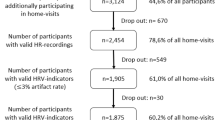Abstract
We examined the role of the type of support provided, gender of support provider, and relationship quality in predicting how social support might influence cardiovascular reactivity during acute stress in women. A group of 88 women received either emotional, instrumental, or no support from a close female or male friend while performing a series of speech tasks. Results suggest that the effectiveness of social support for women depended primarily on the quality of the friendship (i.e., purely positive, or ambivalent). More specifically, women who interacted with a female, ambivalent friend had the largest changes in diastolic blood pressure, total peripheral resistance (TPR), and pre-ejection period compared to the other conditions. Furthermore, receiving emotional support from a purely positive friend was related to lower increases in cardiac output (CO) compared to a no-support condition. In contrast, receiving emotional support from an ambivalent friend was related to larger increases in CO and only small changes in TPR when compared to individuals in the no-support condition. These data are discussed in light of the psychosocial processes underlying social support effects in women, and the importance of a more comprehensive view of how close relationships influence cardiovascular function.
Similar content being viewed by others
References
Allen, K. M., Blascovich, J., Tomaka, J., & Kelsey, R. M. (1991). Presence of human friends and pet dogs as moderators of autonomic responses to stress in women. Journal of Personality and Social Psychology, 61, 582–589.
Barbee, A. P., Gulley, M. R., & Cunningham, M. R. (1990). Support seeking in personal relationships. Journal of Social and Personal Relationships, 7, 531–540.
Barrera, M. (1980). A method of assessment of social support networks in community survey research. Connections, 3, 8–13.
Berkman, L. F. (1995). The role of social relations in health promotion. Psychosomatic Medicine, 57, 245–254.
Berntson, G. G., Quigley, K. S., Jang, J., & Boysen, S. (1990). An approach to artifact identification: Application to heart period data. Psychophysiology, 27, 586–598.
Bolger, N., Zuckerman, A., & Kessler, R. C. (2000). Invisible support and adjustment to stress. Journal of Personality and Social Psychology, 79, 953–961.
Burke, R. J., & Weir, T. (1978). Sex differences in adolescent life stress, social support, and well-being. Journal of Psychology, 98, 277–288.
Burleson, B. R., & Goldsmith, D. J. (1998). How the comforting process works: Alleviating emotional distress through conversationally induced reappraisals. In P. A. Andersen & L. K. Guerrero (Eds.), Handbook of communication and emotion: Research, theory, applications, and contexts (pp. 245–280). San Diego, CA: Academic.
Christenfeld, N., Gerin, W., Wolfgang, L., Sanders, M., et al. (1997). Social support effects on cardiovascular reactivity: Is a stranger as effective as a friend? Psychosomatic Medicine, 59, 388–398.
Cohen, J. (1988). Statistical power analyses for the behavioral sciences. Hillsdale, NJ: Lawrence Erlbaum Associates, Inc.
Cohen, S. (1988). Psychosocial models of the role of social support in the etiology of physical disease. Health Psychology, 7, 269–297.
Cohen, S., & Wills, T. A. (1985). Stress, social support, and the buffering hypothesis. Psychological Bulletin, 98, 310–357.
Coyne, J. C., & DeLongis, A. (1986). Going beyond social support: The role of social relationships in adaptation. Journal of Consulting and Clinical Psychology, 54, 454–460.
Davis, K. E., & Todd, M. J. (1985). Assessing friendship: Prototypes, paradigm cases, and relationship description. In S. W. Duck & D. Perlman (Eds.), Understanding personal relationships: An interdisciplinary approach (pp. 17–28). Newbury Park, CA: Sage.
Fincham, F. D., & Linfield, K. J. (1997). A new look at marital quality: Can spouses feel positive and negative about their marriages? Journal of Family Psychology, 11, 489–502.
Flaherty, J., & Richman, J. (1989). Gender differences in the perception and utilization of social support: Theoretical perspectives and an empirical test. Social Science and Medicine, 28, 1221–1228.
Fiore, J., Becker, J., & Coppel, D. B. (1983). Social network interactions: A buffer or a stress? American Journal of Community Psychology, 11, 423–439.
Glynn, L. A., Christenfeld, N., & Gerin, W. (1999). Gender, social support, and cardiovascular responses to stress. Psychosomatic Medicine, 61, 234–242.
Holt-Lunstad, J., Uchino, B. N., & Smith, T. W. (2000). Relationship quality predicts ambulatory blood pressure during social interactions. Psychophysiology, 37, S49.
House, J. S., Landis, K. R., & Umberson, D. (1988). Social relationships and health. Science, 241, 540–545.
Jennings, J. R., Kamarck, T., Stewart, C., Eddy, M., & Johnson, P. (1992). Alternate cardiovascular baseline assessment techniques: Vanilla or resting baseline. Psychophysiology, 24, 474–475.
Kamarck, T. W., Jennings, J. R., Debski, T. T., Glickman-Weiss, E., Johnson, P. S., Eddy, M. J., & Manuck, S. B. (1992). Reliable measures of behaviorally evoked cardiovascular reactivity form a PC-based test battery: Results from student and community samples. Psychophysiology, 29, 17–28.
Kiecolt-Glaser, J. K., Dura, J. R., Speicher, C. E., Trask, J. O., & Glaser, R. (1991). Spousal caregivers of dementia victims: Longitudinal changes in immunity and health. Psychosomatic Medicine, 53, 345–362.
Kiecolt-Glaser, K. G., & Newton, T. L. (2001). Marriage and health: His and hers. Psychological Bulletin, 127, 472–503.
Kiesler, D. J. (1991). Interpersonal methods of assessment and diagnosis. In C. R. Snyder & D. R. Forsyth (Eds.), Handbook of social and clinical psychology: The health perspective. Elmsford, NY: Pergamon.
Lepore, S. J. (1998). Problems and prospects for the social support-reactivity hypothesis. Annals of Behavioral Medicine, 20, 257–269.
Lepore, S. J., Allen, K. A. M., & Evans, G. W. (1993). Social support lowers cardiovascular reactivity to an acute stressor. Psychosomatic Medicine, 55, 518–524.
Llabre, M. M., Spitzer, S. B., Saab, P. G., Ironson, G. H., & Schneiderman, N. (1991). The reliability and specificity of delta versus residualized change as measures of cardiovascular reactivity to behavioral challenges. Psychophysiology, 28, 701–711.
Manuck, S. B. (1994). Cardiovascular reactivity in cardiovascular disease: “Once more unto the breach.” International Journal of Behavioral Medicine, 1, 4–31.
Nuevo, Y., Cheng-Yu, D., & Mitra, S. (1984). Interpolated finite impulse response filters. IEEE Transactions on Acoustics, Speech, and Signal processing, ASSP-32, 563–570.
Rands, M., & Levinger, G. (1979). Implicit theories of relationship: Anintergenerational study. Journal of Personality and Social Psychology, 37, 645–661.
Rook, K. S. (1984). The negative sideof social interaction: Impact on psychological well being. Journal of Personality and Social Psychology, 72, 1349–1363.
Seeman, T. E. (1996). Social ties and health: The benefits of social integration. Annals of Epidemiology, 6, 442–451.
Sherwood, A., Allen, M., Fahrenberg, J., Kelsey, R., Lovallo, W., & Van Doorman, L. (1990). Methodological guidelines for impedence cardiography. Psychophysiology, 27, 1–23.
Shumaker, S. A., & Hill, D. R. (1991). Gender differences in social support and health. Health Psychology, 10, 102–111.
Smith, T. W. (1992). Hostility and health: Current status of a psychosomatic hypothesis. Health Psychology, 11, 139–150.
Smith, T. W., Gallo, L. C., Goble, L., Ngu, L. Q., & Stark, K. A. (1998). Agency, communion, and cardiovascular reactivity during marital interaction. Health Psychology, 17, 537–545.
Smith, T. W., Gallo, L. C., & Ruiz, J. M. (in press). Towards a social psychophysiology of cardiovascular reactivity: Interpersonal concepts and methods in the study of stress and coronary disease. In J. Suls & K. Wallston (Eds.), Social psychological foundations of health and illness. Oxford, England: Blackwell.
Smith, T. W., Limon, J. P., Gallo, L. C., & Ngu, L. Q. (1996). Interpersonal control and cardiovascular reactivity: Goals, behavioral expression, and the moderating effects of sex. Journal of Personality and Social Psychology, 70, 1012–1024.
Smith, T. W., Nealey, J. B., Kircher, J. C., & Limon, J. P. (1997). Social determinants of cardiovascular reactivity: Effects of incentive to exert influence and evaluative threat. Psychophysiology, 34, 65–73.
Tomaka, J., Blascovich, J., Kibler, J., & Ernst, J. M. (1997). Cognitive and physiological antecedents of threat and challenge appraisal. Journal of Personality and Social Psychology, 73, 63–72.
Trobst, K. K. (2000). An interpersonal conceptualization and quantification of social support transactions. Personality and Social Psychology Bulletin, 26, 971–986.
Uchino, B. N., Cacioppo, J. T., & Kiecolt-Glaser, J. K. (1996). The relationship between social support and physiological processes: A review with emphasis on underlying mechanisms and implications for health. Psychological Bulletin, 119, 488–531.
Uchino, B. N., Holt-Lunstad, J., Uno, D., & Flinders, J. B. (2001). Heterogeneity in the social networks of young and older adults: Prediction of mental health and cardiovascular reactivity during acute stress. Journal of Behavioral Medicine, 24, 361–382.
Umberson, D. (1987). Family status and health behaviors: Social control as a dimension of social integration. Journal of Health and Social Behavior, 28, 306–319.
Winstead, B. A., Derlega, V. J., Lewis, R. J., Sanchez-Hucles, J., & Clarke, E. (1992). Friendship, social interaction, and coping with stress. Communication Research, 19, 193–211.
Wiggins, J. S., & Broughton, R. (1991). Ageometric taxonomy of personality scales. European Journal of Personality, 5, 343–365.
Wiggins, J. S., Trapnell, P., & Phillips, N. (1988). Psychometric and geometric characteristics of the revised Interpersonal Adjective Scales (IAS-B5). Multivariate Behavioral Research, 23, 517–530.
Author information
Authors and Affiliations
Additional information
This research was generously supported by Grant1 R01 MH58690-01 from the National Institute of Mental Health awarded to Bert N. Uchino.
Rights and permissions
About this article
Cite this article
Uno, D., Uchino, B.N. & Smith, T.W. Relationship quality moderates the effect of social support given by close friends on cardiovascular reactivity in women. Int. J. Behav. Med. 9, 243–262 (2002). https://doi.org/10.1207/S15327558IJBM0903_06
Issue Date:
DOI: https://doi.org/10.1207/S15327558IJBM0903_06




